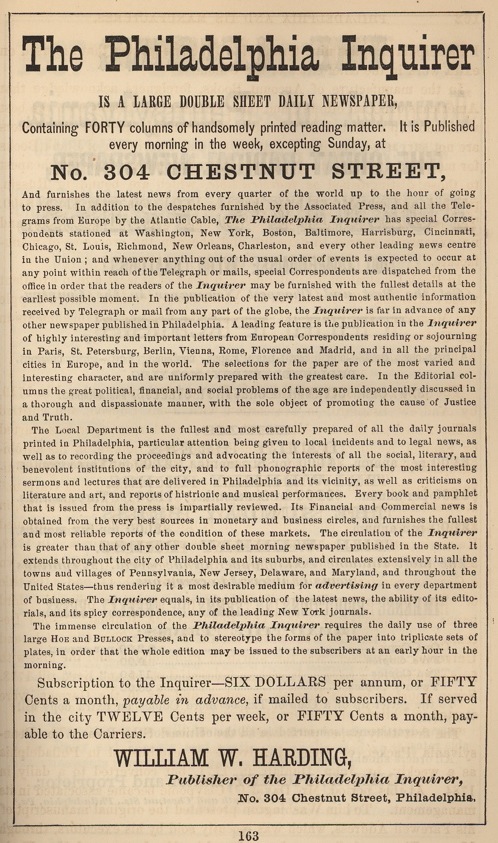400 N. Broad Street, Philadelphia PA 19130
© Carmen A. Weber, Irving
Kosmin, and Muriel Kirkpatrick, Workshop of the World (Oliver
Evans Press, 1990).
The Philadelphia Inquirer
actually began on June 1, 1829 as the Pennsylvania
Inquirer. Six months later, Jesper Harding purchased the
paper as well as numerous other papers over the next 30
years. The paper originated out of a variety of locations
in Center City, including the first Inquirer building at
the southeast corner of 3rd Street and Carter's Alley,
south of Chestnut Street. This iron and glass front
building housed a flatbed press. Harding built his own
paper mill to supply the press. His success was such that
he was able to obtain the first American rights to
publish several of Charles Dicken's novels in serial form
in his paper, including Barnaby Rudge and Master
Humphrey's Clock.

© Edwin T.
Freedley, Philadelphia
and its Manufactures (1867), p.
163.
When his son, William W. Harding became the owner in
1859, the name of the paper was changed to the
Philadelphia Inquirer. The paper moved to 304 Chestnut
Street and installed a Bullock steam printing press the
first of its kind in the world. Circulation grew from
7,000 in 1859 to 70,000 by 1863, possibly based on its
excellent reporting of the Civil War. In the next 20
years, Harding's health and the country's economic
conditions declined, so Harding was glad to sell the
paper to British-born James Elverson in 1889. Elverson
moved the press further west on Chestnut and equipped it
with the most up-to-date presses and typesetters, he was
the first to switch to electrically-power the press room.
Elverson used the paper to initiate civic improvements,
promoting the Reading Terminal and Benjamin Franklin
Parkway.
Elverson's son became publisher after his father's death
in 1911. He built the Elverson Building at Broad and
Spring Garden Streets; he and his wife used the 12th and
13th floors for living space. Elverson Jr.'s sister
inherited the paper at his early death in 1929. At this
time shares in the paper were offered on the public
market and the controlling interest was purchased by
Curtis-Martin Newspapers. However, they defaulted on
payments and the Inquirer was returned to the Elverson
Corporation. Ultimately the paper was bought by the
Annenberg family who ran it from 1936 until 1969, when it
was sold to Knight Newspapers, who merged with Ridder
Publishing Company. In 1984 Time magazine called the
Inquirer one of the 10 best dailies, and its staff has
won more journalism awards that any other paper in the
country.
The Elverson Building housing the Inquirer has been a
part of the Philadelphia skyline since it was erected in
1925. This beautiful white building, with its lantern top
was constructed to house the newspaper office and
printing plant, in 1948 Annenberg added a building for
the rotogravure presses used to print the color
supplements, T.V. Guide, and Seventeen, magazine.
1
Update May
2007 (by
Torben Jenk & Harry Kyriakodis):
Still used as the
headquarters by the Philadelphia Inquirer and Daily News.
The printing presses were moved to a new facility in
Conshohocken. The 1948 addition—located on the site
of the main Baldwin Locomotive Works plant demolished in
1937—is now the headquarters of the School District
of Philadelphia.
1 Prepared from materials
in the files of the Philadelphia Historical Commission.
See
also:
Philadelphia Inquirer
website
Daily News website